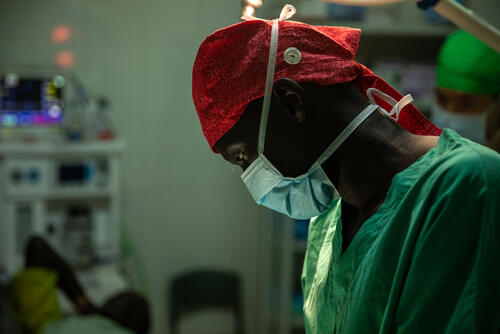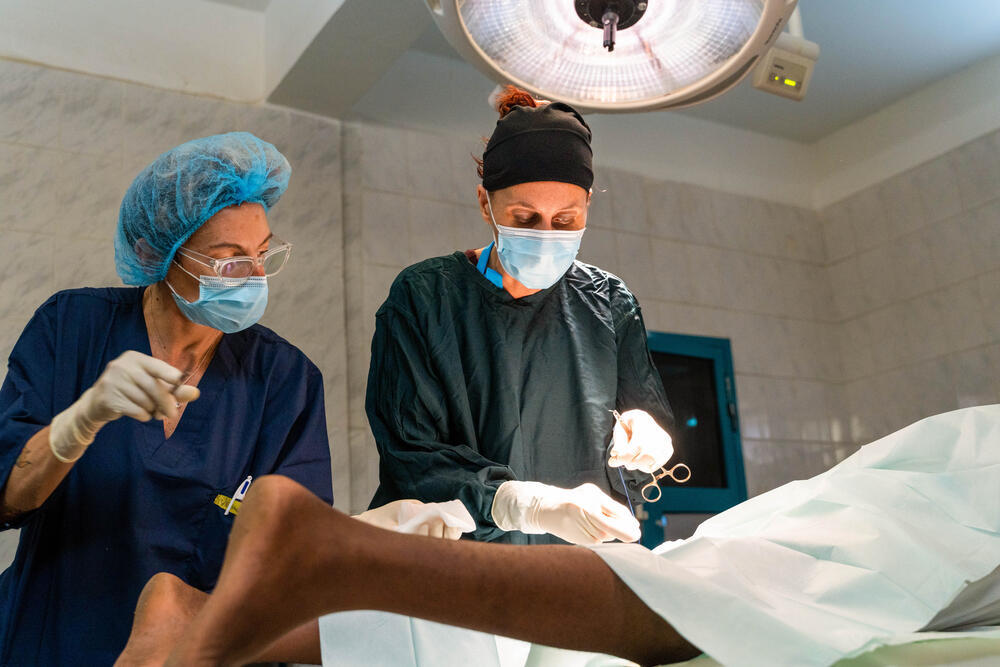Sudan: Unconscionable surgical ban in Khartoum putting lives at risk
An unconscionable ban is preventing life-saving surgical supplies from being transported to hospitals in Khartoum.
Affecting areas of the city controlled by the Rapid Support Forces (RSF), the ban is putting the lives of hundreds of people at risk – including women and children.
The ban must immediately be reversed, says Médecins Sans Frontières / Doctors Without Borders (MSF).
Caesarean sections
Implemented in early September and communicated to MSF by the Sudanese authorities on 2 October, the ban is being enforced with the intention of preventing wounded soldiers from being able to receive life-saving treatment in the capital.
Such a ban not only contravenes the international laws of war – which the Sudanese Armed Forces (SAF) and the RSF reconfirmed their commitment to in the Jeddah declaration in May – but also, by its very nature, will have deadly consequences on the lives of civilians who will also be deprived of treatment.
“This heartless decision to leave women in labour to suffer, and for some to die, as a side effect of the inhuman policy to make wounded combatants bleed out to death is gruesome and must be reversed.”
“The ban is a ruthless tactic that will likely cause the preventable deaths of hundreds of people in Khartoum over the coming weeks,” says Claire Nicolet, MSF’s head of emergencies for Sudan.
“Two-thirds of the surgeries we carry out in the Turkish Hospital are caesarean sections. In the past two months alone, we have performed 170 of such surgeries – without this procedure, many of the women and their newborn babies would have died.
“Women in labour needing C-sections already have very few options available to them in Khartoum. If we continue to be denied permission to bring surgical supplies to our hospital, soon they will have no options at all.”
When it comes to the war wounded, MSF treats people based on their medical needs. It is against medical ethics to refuse life-saving treatment to someone – no matter whether they have been fighting or whether they have been caught in the crossfire.
Mass casualty incidents
On 10 September, when Khartoum’s Gorro market was bombed, there were 103 casualties – 43 people were killed, and 60 wounded people were treated at Bashair Teaching Hospital, including women and children.
However, MSF had to stop providing surgery in this facility in October because of the ban, meaning that the Turkish Hospital is now one of the only facilities in southern Khartoum with a fully functioning operating theatre.
Support our expert surgical teams working in crisis zones worldwide

Following two recent mass casualty incidents on 12 and 13 November, MSF received 128 wounded people in the emergency room of the Turkish Hospital. Several surgeries have already been performed and many patients are still waiting to go into theatre. As a result, there are now not enough supplies left in the hospital to last for even a month.
If MSF is not able to bring in more supplies, the operating theatre in the Turkish Hospital will also have to close its doors and there is no doubt that the death toll of this war will rise further, as women, children and men in need of life-saving surgery will be unable to get treatment.
Humanitarian workers
Adding to the severity of the situation, the ban does not only impact on the transportation of supplies. Humanitarian workers – including medical personnel – are also being denied travel permits.
Although there has been no official announcement to MSF from the authorities on this issue, the facts are that not a single member of medical staff – Sudanese or foreign – has received authorisation to travel to south Khartoum for work since early October.
Despite the SAF committing at the talks in Jeddah to allow 90 trucks of relief supplies to travel to Khartoum, to date no convoys have reached their destinations. Travel permits for MSF trucks remain blocked.
“There are MSF supplies and staff ready and waiting in Wad Madani, less than 200km from Khartoum,” says Claire.
“The Sudanese Armed Forces are actively blocking the delivery of medical care for the population of its capital.
“Although many departments of the Sudanese government, international organisations and diplomatic missions involved in the Sudanese crisis have been informed of the ban, they are yet to do anything about it.
“This heartless decision to leave women in labour to suffer, and for some to die, as a side effect of the inhuman policy to make wounded combatants bleed out to death is gruesome and must be reversed.”
MSF and the crisis in Sudan
On Saturday 15 April, intense fighting broke out across Sudan with a wave of gunfire, shelling and airstrikes.
The violence between the Sudanese Armed Forces (SAF) and the Rapid Support Forces (RSF) has trapped millions of people in the middle of an unexpected conflict. Many have been forced to flee their homes while access to essential services such as healthcare has become increasingly difficult.
Médecins Sans Frontières / Doctors Without Borders (MSF) teams already working in Sudan have been responding to the crisis since its first moments.
